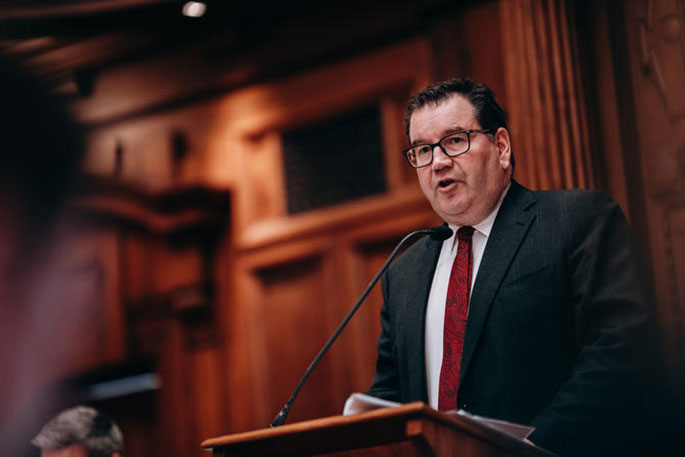Businesses will receive the lion’s share of a $12.1 billion economic rescue package as New Zealand responds to the Covid-19 crisis.
Senior ministers announced the stimulus economic package at Parliament Tuesday, saying it will take effect immediately.
The biggest boost is $5.1 billion towards wage subsidies for affected businesses in all sectors and regions, which kicks in immediately. A major public information campaign is about to commence.
Beneficiaries will also get an immediate and permanent increase of $25 a week in the hand, and the Winter Energy Payment, which beneficiaries and superannuants receive, will be doubled this year.
Together that will cost $2.8 billion while another $2.8b is being invested in business tax changes to free up cashflow.
That will include a provisional tax threshold life, the reinstatement of building depreciation and writing off interest on the late payment of tax.
Finance Minister Grant Robertson says this package is about “cashflow and confidence” and is only the beginning of the support that will be rolled out to help New Zealanders through this crisis and to recover from it.
“We will fight this virus. We will cushion the blow for businesses and workers. We will position for recovery. We have been and we will be swift, decisive and compassionate.
“The package represents four per cent of GDP and is “more than the total of all three Budgets’ new operating spending in this term of Government put together.”
Grant says latest Treasury forecasts show New Zealand’s fiscals will be impacted – there will be higher debt, there will be deficits and unemployment will rise steeply.
“This is the rainy day that we have been planning for.”
Help for business and beneficiaries
Wage subsidies will be available for businesses in all parts of the country that can show they’ve had a 30 percent decline in revenue for any month between January and June 2020 compared to the year before.
For eligible businesses, employers will be paid $585.50 per week for full-time staff, and $350 for part-time staff.
Payments will be capped at $150,000 per business and will be paid in one lump sum for up to 12 weeks.
A support package estimated to cost $126 million is also being made available for those people unable to work because they’re either in quarantine, sick from Covid-19, or caring for family in either of those situations.
These payments will be the same as the wage subsidy amounts but are only available for eight weeks and employers will be expected to meet all of their requirements in terms of sick leave.
An increase of $25 a week for all main benefits starts on April 1 and the Ministry of Social Development estimates about 350,000 low-income families will benefit.
The annual Winter Energy Payment will double to $1400 for couples and $900 for single people.
It will start on May 1 and the rates for this year only will be $40.91 per week for a single person and $63.64 a week for couples or people with dependants.
Boost for health
A dedicated $500 million fund for health was also announced; that includes extra intensive care capacity and equipment for hospitals, support for GPs and primary care and improving video conferencing and telehealth consultations.
The funding will also nearly double resources for Public Health Units to increase the ability to contact trace the virus.
Healthline will also receive a $20 million boost for more staff.
Health Minister David Clark says so far the medical response has been “world-leading”.
“We know we will see more cases of Covid-19 arrive here. So we must plan and prepare for that reality.”
Aviation and redeployment
Support of $100 million has been allocated for the redeployment of workers.
The Covid-19 Cabinet committee will meet tomorrow to agree to the first round of assistance, starting with the Tairawhiti region.
The committee will also discuss new measures to help the aviation sector and to protect supply chains.
This package is estimated to cost $600 million and does not include any support for Air New Zealand.
Instead it’s expected to assist the country’s largest airports suffering a huge downturn in travel.
Grant says discussions about how to help Air New Zealand were still underway and he was limited in what he could say about it at the moment.
He says it’s still unknown what the full impact will be on New Zealand’s economy, “however we do know it will cost us jobs and have a significant impact on business”.
That means there will be some businesses that fall “outside the scope of the proposed business and employee support package”.
“Officials have been asked to develop options so the government can support larger businesses that have been materially impacted by Covid-19,” he says.
- If you have symptoms of the coronavirus, call the NZ Covid-19 Healthline on 0800 358 5453 (+64 9 358 5453 for international SIMs)





